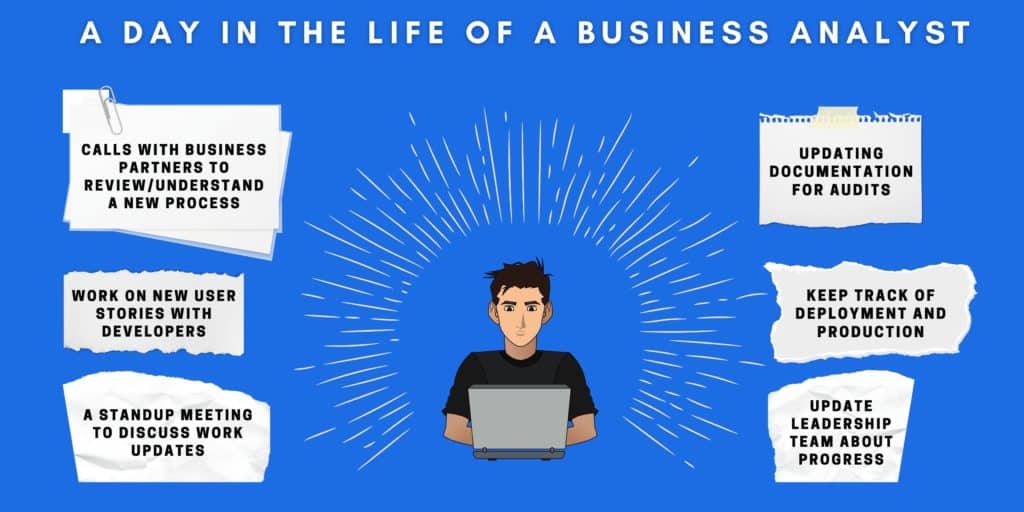- Who is a Business Analyst? What do they do?
- Business Analyst Job Description
- How to Become a Business Analyst?
- Business Analyst Skills
- Tools used by Business Analyst
- Types of Business Analyst Jobs and Career Path
- A day in the life of a Business Analyst
- Business Analyst Salary Overview
- Business Analyst Salary basis Job role - in USA and India
- Does Business Analyst have a future?
- FAQs
Who is a Business Analyst? What do they do?
Business analysts work with organizations to help them improve their processes and systems. They conduct research and analysis in order to come up with solutions to business problems and help to introduce these systems to businesses and their clients.
While there are still ongoing developments in various technologies such as Artificial Intelligence, Machine Learning, IoT, Robotics, etc., Business Analytics has gained the status of being all-pervasive. Almost every aspect of our life has been touched by Analytics. Nearly 90% of all organisations have set up Analytics in their functioning over the past 5 years and nearly every domain has been a rise of opportunities in this sector. You must be wondering, what exactly is the job description of a Business Analyst:
Business Analyst Job Description
In the enterprise and IT sector, Business Analysis has emerged as a core business practice. Business Analysis refers to understanding the changing business needs, evaluating the impact of these changes, identifying and analysing requirements, and documenting and facilitating communication among all the stakeholders involved.
They contribute actively to an organisation's profitability and sustainability. Business Analysts guide organisations to improve their process and quality of products and services.
Important Roles and Responsibilities include:
- Evaluating business processes, predicting requirements, designing and implementing solutions
- Staying updated on the latest technologies to automate processes and improve efficiency
- Analysing business processes and communicating feedback to other team members and management
- Budgeting and forecasting
- Planning and monitoring projects with regular check on requirements
- Responsible for pricing
- Conducting detailed market research and competitive analysis
- Regular Reporting and Analysis
- Managing competing resources and priorities with regular check on delivarbales
- End to end project management
- Leading and managing teams
Also Read: Difference between Business Analyst and Data Scientist
How to Become a Business Analyst?
With the massive amount of information available to us today, it becomes easier to successfully achieve your dream job. Here are a few steps you can follow to understand about how to become a business analyst:
1. Earn a bachelor’s degree: A bachelor’s degree is a must to enter this field. Often students come from the accounting, finance, or business administration and engineering field to pursue their career in business analytics.
2. Supplement your undergraduate education with an advanced degree in business analytics, data science, statistics, finance, or economics: You may have to complete an advanced degree in business analytics or an MBA program to pursue a business analytics position at a management level. Consider enrolling in a master’s in business analytics or a master’s in business administration program to stand out in the crowd.
3. Get Certified: Graduates can earn certifications to gain critical supplementary knowledge and those who are advancing to a new position can earn these certifications to highlight their competency. There are many courses available online from top universities that generally last for weeks.
4. Gain real-world experience: If you are a fresher get an early jump by pursuing summer internships in related fields.
Great Learning offers a rigorous data science & analytics course that you can opt for and become a certified professional. You must be wondering, ‘Is SQL Required for business analysis?’, ‘Is a business analyst an IT job?’, we’ll be answering all your questions here. Continue reading to know the exact necessary skills.
Business Analyst Skills
Just like any other job role, it is crucial to possess certain skills to become a business analyst. Both technical skills and business skills are equally important and have been listed below for your reference. Business analysts are not limited to any particular department, but they work with multiple departments. The business analysts' work ranges from IT, operations, and executives. When their work ranges to each department, these business analysts have a variety of responsibilities, and for this, they would require a diverse set of skills.
According to Great Learning business analytics experts and faculty, some of the top business analyst skills required are:
- Analytical Problem Solving capabilities
- Interpersonal and consultative skills
- Oral and written communication proficiency
- Creative Outlook
- Basic software knowledge and skills
- Basic programing language knowledge
- Understanding of Databases and Networks
- Industry knowledge
- Business structure understanding
- Knowledge of Relevant Tools, e.g.:BluePrint
- Stakeholder Analysis
- Cost-Benefit Analysis
- Requirements Engineering
- Process Modeling
These Technical Skills should have in the candidate for Business Analysts Job
Before we start with the technical skills, we should first know why technical skills are essential for business analysts. The fundamental reason behind the importance of technical skills of business analysts is that they provide the tools to the organization that helps identify and address all the issues and find the solution of these solutions.
These business analysts help to improve the processes for the departments and organizations by analyzing the existing policies and the existing systems and making required and necessary recommendations for the benefits of organizations. They help to enhance efficiency and reduce expenditure. If business analysts have the technical knowledge and are proficient in these skills, then business analysts can do these tasks quickly and with more accuracy.
Basic Skills For Business Analysts
The most basic technical skill that every business analyst should possess. The business analyst should have deep knowledge of these applications used in offices. Some of these applications are as follows-
- Microsoft word (word processing).
- Spreadsheets.
- Powerpoint presentations.
- Charts.
- Diagrams.
- Email.
Knowledge Of Common Operating Systems
When you are into the profession of business analysts, then you should have a clear understanding of various functionalities and the capabilities of the operating systems that are most commonly used.
Knowledge Of Software Testing Skills
Software testing is sometimes part of the job of a business analyst. Due to this, business analysts should clearly understand different methodologies to test software. They should also know the benefits and drawbacks of different testing methods. Apart from all this, they should also know the best testing type for the software. For testing the software, the business analyst should have some basic knowledge, and they are as follows-
- Test cases
- Manual testing
- Test scripts
- Automated tests
Knowledge Of Programming Languages
The job of business analysts is not to sit and write the code, and they are not required for that. But still, it is mandatory that they should possess a basic knowledge of programming languages such as Java, C++, PHP, Python, and Visual Basic. The programming knowledge is mandatory for business analysts at the primary level only because with this knowledge, they will be able to help the company identify the problems and find out the perfect solution for it or develop the solution for the identified problem. If the business analysts are skilled with programming languages, they can prove assets for the company.
Knowledge Of Using Database
The business analyst should have a clean hand in the database. They should know how to compile and manipulate data, and to perform these functions, one should have a deep knowledge of databases and the types of databases. The knowledge that a business analyst should have regarding database are as follows-
- They should know about relational databases such as SQL Server, Oracle, and MySQL.
- They should also know about non-relational databases such as stores of key volumes, document stores, and wide column stores.
- They should have knowledge of cloud databases.
- They should have knowledge of real-time databases.
Should Possess Problem-Solving Skills
One of the most important skills that a business analyst should possess is problem-solving skills. The problem-solving task comes under the most significant duties that business analysts perform. There are several steps in problem-solving. The first step is to evaluate the problems from each and every perspective. The second step is to determine the benefits and the drawbacks of the given various solutions. The last and final step is to predict the outcomes.
Should Have Good Communication Skills
The role of business analysts is to work in different departments. They have to work with various professionals of those various departments so that they can develop or find out the best solution for the company. They often bridge the technical professionals and the laypersons who don't have any knowledge. Business analysts are supposed to communicate the complex concepts and solutions in a very simple language or in a very easy way so that they can be understood. Most of the time, during an interview of business analysts, the recruiters observe employees and report their recommendations to the management based upon the communication skills of a business analyst.
Should Have Good Research Skills
Business analysts should also possess the skills of research. With the help of research skills, one can explore the challenges and find the cause of any problem. If business analysts have research skills, then they can perform various tasks, and they are as follows-
- They will be able to ask the right questions.
- They will be able to gather all the relevant information from the appropriate sources.
- They will be able to develop a hypothesis.
- They will be able to write comprehensive reports.
Should Have Knowledge Of Software Development Methods
A business analyst should also have a basic knowledge of the different development methods of software. Some of the methodologies are as follows-
- The Agile development.
- The DevOps deployment.
- The Waterfall development.
- The Rapid application development.
Should Have Good Documentation Skills
When it comes to documenting a report, it should include their data and their findings on that data. The role of business analysts is the major role as they have to find out the most appropriate ways for documentation.
There are different types of documentation, and they are as follows-
- The System documentation.
- The User documentation.
- The Process documentation.
- The Source code documentation.
How To Improve Your Technical Skills
There are some ways through which you can improve your technical skills and they are as follows-
- You should learn additional IT skills.
- You should practice your communication skills.
- You should apply your research skills.
- You should work on your software development knowledge and improve it.
- You should review various documentation materials for future use.
Business Skills for Business Analysts-
- Analytical Problem-Solving: Large amount of data needs to be analysed on a daily basis, and thus analytical problem-solving skills are essential.
- Effective Communication: Laymen might not be able to understand technical and complicated reports and presentations. Thus, this data needs to be presented in a manner such that it can be understood and there is effective communication.
- Creative Thinking: Traditional methods might not continue to work, as there are new technological advancements coming up every day. Brainstorming sessions are essential for coming up with creative ideas.
- Industry Knowledge: Certain degree of industry knowledge is also required.
Business Analyst Qualification -
Organizations seek a combination or any one of the following qualifications in their prospect employees as business analysts:
- An undergraduate degree in computer science, business information systems, computing and systems development, and business management.
- Postgraduate degree specializing in areas of business analytics
- A certification course from a reputed institute such as Great Learning. Such certifications prepare professionals from various different educational and professional backgrounds for business analytics roles.
Tools used by Business Analyst
- Modern Requirements
- Blueprint
- MS Visio
- SWOT
- Trello
Organisations need to track their performance to see whether certain strategies are working or not. To do so, there are plenty of tools available today. Making use of these tools will improve productivity and prove to be beneficial. Here’s a list of tools being used and important features of the same.
1. Modern Requirements-
This tool has been recognised as a leading business analytics tool because it provides a collaborative definition and analysis. Requirements are defined both through text and visually. Smart Docs, Trace Analysis, and other elicitation tools are supported by Modern Requirements.
Key features-
- Online document authoring in pre-defined templates
- Customisable generation of documents
- AI inspired BA assistance: Alice
- Test case automation and user story generation
2. Blueprint-
Blueprint is another important software tool used by enterprises to build better applications. This tool allows us to align business strategy with IT execution. Here are some key features-
- Helps to reduce IT compliance risk and define the usage of certified compliance
- Supports organisational transformation
- Easy-to-use dashboards and rich tools used for reporting
3. MS Visio
A modelling tool used by Business Analysts to effectively capture and present stakeholder’s ideas in the form of business functions and user interactions. Here are the main uses of MS Visio-
- Preparing process flow charts
- Creating data models
- Generating architecture diagrams
4. SWOT
This is one of the most common and widely used techniques by organisations in order to evaluate a business. The main features of SWOT analysis are as follows-
- It is a free tool and is one of the most secure tools
- Allows business analyst to load and save to local XML files
- Can export and view .png files

5. Trello
A collaboration tool that helps communicate between various teams and in sharing information in a secure manner, Trello allows admins to analyse business data. The main features of Trello are-
- Allows viewing team activity across boards
- Assigns admins for privacy settings management
- Helps export data with a single click
- Associates and organises boards with collections
Types of Business Analyst Jobs and Career Path
- Business Process Analyst
- IT Business Analyst
- System Analyst
- Usability or UX Analyst
- Data Analyst
These Five are the types of Business Analyst Jobs let's know deep.
1. Business Process Analyst
Job Description: A Business Process Analyst Role involves “thinking processes”. BPA’s tend to draw inference from process details. They link these inferences to the big picture by taking into consideration the business objectives and identifying process improvements. A BPA can structure a large amount of information within a small framework.
Responsibilities: BPA does a wide range of jobs and works on various projects. A BPAs main interaction would be with the business teams and the IT Department. You will often facilitate workshops, collect information and analyse this data. The job also involves analysing workflow and finding the most optimal solution for the same. A BPA may also have to document procedures and present this data to stakeholders for discussion.
Skills Required/Qualification: BPAs need to have an understanding about how ERP, BPM, CRM and BI tools operate and understand protocols like SOAP, WSDL, XML and other key protocols. The background of a BPA is usually Computer Science, Business or operations. A good candidate should have problem-solving skills and excellent diagrammatic and communication skills.
2. IT Business Analyst
Job Description: IT Business Analysts are in charge of enhancing the quality of IT Products and services, and analysing data that will be used to make informed business decisions and find technological solutions to business needs.
IT Business Analyst Responsibilities in Job
- Acting as an information source between business branches
- Understand different strategic needs and plans for growth
- Utilising IT data for business insights
- Running A/B tests and analysing results
- Sourcing and implementing new business technology
Skills Required/Qualification: Degree in Computer Engineering, Business Administration or a similar field, analytical mindset, exceptional interpersonal skills, and problem-solving skills.
Also Read: Top Business Analyst Interview Questions
3. System Analyst
Job Description: The main role of a system analyst is to analyse how well the software, hardware and their wider IT systems fit an employer’s or client’s business needs. A system analyst also writes requirements for a new system and implements them in order to monitor effectiveness.
Responsibilities of System Analyst
- Requirement gathering (by talking to users)
- Producing the specifications for modified systems
- Liaising with IT staff to produce new systems
- Examining the current system
- User training and feedback
Skills Required/Qualification for System Analyst
- C
- COBOL
- Software design, documentation, testing, and maintenance
- Hardware requirements
- Teamwork
- General consulting skills
- Software architecture
4. Usability or UX Analyst
A UX Analyst is someone who is involved in the interface design or user experience for websites and software applications. Analysts who dedicate their time to user experience requirements and create the actual UI designs, mockup or prototype are known as UX Analysts. They don’t just decide how the interface will look like, but also how the end-user will interact with this interface.
The various requirements in order to become a UX Analyst are as follow-
- Graphic Designing Skills
- Focus on ease of use
- Understands the end-user's behaviour
- Designs efficient user interface
5. Data Analyst
A data analyst interprets data to analyse results to a specific business problem that needs to be solved. He/She improves statistical efficiency and quality. A Data Analyst must also implement databases, data collection tools, and data analytics strategies. He/She is also involved in Pattern Recognition in complex data sets and Data filtering and cleaning by reviewing regularly.
Skills Required for Data Analyst
- Programming Languages (R/SAS)
- Creative and Analytical Thinking
- Effective Communication
- Data Visualisation
- SQL Databases
- Database Querying Languages:
- Data Mining, Cleaning and Munging
- Advanced Microsoft Excel
- Machine Learning
Also Read: Top 10 Business Analytics Companies to work for in 2021
A day in the life of a Business Analyst

Business Analyst Salary Overview
| Average Salary | 6.5 lakhs per annum |
| Entry Level/ Fresher | 3.5-5 lakhs per annum |
| 5-9 years | 8-9 lakhs per annum |
| >=15 years | 12-16 lakhs per annum |
The national average salary for a Business Analyst in India is ₹6,66,084. According to reports, salaries are highest at Cognizant Technology Solutions Corp. Companies such as Capgemini and Tata Consultancy Services Limited also pay a comparatively higher amount. Accenture pays at the lower end of the scale, the salary being ₹594,500. Your skills and work experience play an important role in the salary you receive. Someone at an entry-level would not get paid the same as someone with 4-5 years of work experience. The location you are situated in plays a significant role as well.
Learn more about business intelligence analysts salary here.
Business Analyst Salary basis Job role - in USA and India
| Job Role | Avg. salary in USA/yr | Avg. salary in India/yr |
| Business Process Analyst | USD 68,000 | INR 4,14,000 |
| IT Business Analyst | USD 75,000 | INR 6,00,000 |
| System Analyst | USD 71,000 | INR 6,40,000 |
| Usability or UX Analyst | USD 67,000 | INR 4,80,000 |
| Data Analyst | USD 65,000 | INR 4,10,000 |
Does Business Analyst have a future?
Organisations are dependent on Business Analysts to guide them in the right direction and provide advice on the best practices to be followed. Machine Learning, Artificial Intelligence, and IoT have the power to significantly impact businesses and provide data patterns. More than half of the working population will require upskilling by 2022 and up to 85% of companies will adopt big data analytics. The role of a Business Analyst may transform with these changes, but the demand will not die. Business Analytics professionals are required in every industry, from leading financial institutions to online e-commerce leaders like Amazon. The future is bright and now is the time to upskill and reach your career goals.
Take advantage of the data science and analytics career opportunities that exist today. Explore a career in Business Analytics with our PGP – Data Science and Analytics course.
Here are a few advantages of a career in Business Analytics:
Learn Advanced technology: Business analytics requires third-party software to decrypt hordes of data. However, in order to make the best use of these software’s, professionals must require training and must keep an eye on trending technologies. These professionals should also learn advanced machine languages, like Python, which can be used to write problem-solving scripts.
Better Decision Making: Business Analytics is a subset of data science. This uses business-related knowledge to grasp actionable intelligence from raw data. Since these collected data are of the highest accuracy, this can be used to make very specific and profitable decisions that will help the business grow.
Relevant Job Sector: Companies are looking to use machines and automate most of their work. Behind this automation, will always require a human being to maintain and automate a task in a given manner, this makes it a very secure job.
High Salaries: This field has become an inevitable part of the organizations, they are looking for skilled professionals to execute their work and ready to pay the highest salaries. Therefore, any professional who has come to this field will be picked up by companies and are paid high salaries for their expertise.
FAQs
1. Is coding required for business analyst?
Being able to write a code is not mandatorily required to be working as a business analyst. While managing and analyzing data, business analyst can work with statistical software such as SPSS, SAS, Sage, Mathematica, and even Excel.
2. What are your strengths as a business analyst?
Technical skills, strong aptitude for numbers, ability to quickly pick up new systems and technology, and people skills are key to becoming a successful business analyst. Communication, negotiation, and facilitation skills are also important.
3. What techniques do business analysts use?
Here are the top 8 techniques used by business analysts:
- SWOT Analysis.
- MOST Analysis.
- PESTLE Analysis.
- System Analysis.
- Business Model Analysis.
- Brainstorming.
- Mind Mapping.
- Process Design.
4. What are the 3 most important skills of a business analyst?
The three most important skills for a business analyst are:
- Oral and written communication skills.
- Technical Know-how
- Analytical thinking and problem-solving.
5. Is business analyst a dying career?
The role of a business analyst is not a dying career. The role is very much in demand by a large range of companies across the world, who continue to recruit and hire.






